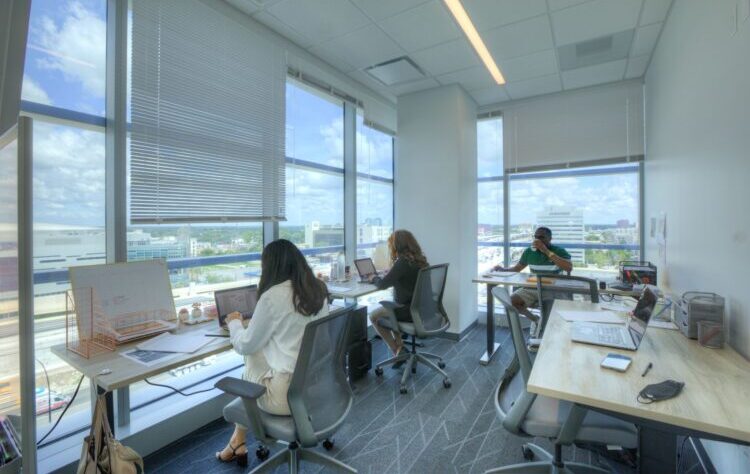How the Pandemic Reshaped Shared Workspaces: A Surge in Demand for Flexibility
By William Williams, June 13, 2021
The COVID-19 pandemic has impacted all facets of office work — and dramatically in some respects.
However, companies that offer shared workspace services have actually benefited from changes the coronavirus thrust upon office workers. The positive results might seem surprising on the surface. But when considered in detail, they actually make sense.
Jon Pirtle, CEO of Nashville-based e|spaces, says business has remained very stable during the pandemic. And for every member lost, a new member has emerged.
Pirtle says that since the pandemic hit, he has observed established companies utilizing e|spaces for cost savings and for landing new clients. As an example, banks are starting to question their traditional sales model, he notes.
“I was speaking to a member the other day and he said, ‘Why do we make a potential mortgage client come to us? We should go where the clients are,’” he says. “They can set up a small office exactly in the middle of 50 potential clients who walk by their office every day, and they get to know a new prospect pool. They save money in the process. It’s that kind of use that we’re seeing more and more of from companies of all sizes.”
Pirtle says one of the positive results of the pandemic is the diverse makeup of e|spaces’ clientele. People — entrepreneurs and those employed by larger organizations — who might never have looked for co-working space are seeking it now.
“It’s creating a great energy in our spaces,” he explains. “It’s also emphasized that we live in a highly connected and collaborative world that has a different set of needs from [those needs of] just a few years ago. We’re uniquely positioned to provide those solutions.”
Errol Williams, WeWork’s Atlantic Territory vice president, says that due to the pandemic, flexibility will continue to be a key priority for every size business worldwide.
Williams predicts the conventional office model will survive. However, while companies re-evaluate and rethink their workplaces, WeWork is seeing the market — and specifically enterprise companies — realize the value of its “flexibility at scale.”
“We’ll see this demand for flexibility continue post-pandemic as companies and employees do away with this idea of ‘presenteeism’ in the office in favor of providing the best location for employees to do their work,” he says. “There is no longer a playbook for teams and employees. And the more flexible options companies provide, the better.”
Moving forward, and as business leaders continue to think about the future and adapting to their employees’ needs, Williams and WeWork foresee them providing access to clean, flexible workspace in the same way they provide perks and benefits like health care or free lunches. For this reason, WeWork has accelerated its plans to digitize its product, providing users with the ability to choose when, where and how they work, directly from their phones.
“The shift towards greater demand for flexibility and optionality will define the way we work moving forward, and WeWork’s On Demand and All Access products (both available in Nashville) are uniquely positioned to solve for this need long-term,” he says.
Williams says WeWork is now speaking to various higher education institutions that are searching for space solutions in order to reopen schools and reimagine how they use spaces for learning. The company has seen “early successes” with Georgetown University, Northeastern University, the University of Arizona and New York University Shanghai, he says.
In April, WeWork unveiled its Future of Workplace plans, which include de-densifying spaces, enhancing sanitization and increasing air circulation, and adding signage to promote health-focused behaviors like wearing masks and maintaining social distance.
And with the pandemic’s impact easing, one thing cannot be denied, e|spaces’ Pirtle says: “There have been a lot of entrepreneurs born in the last year — through force or by choice.”
